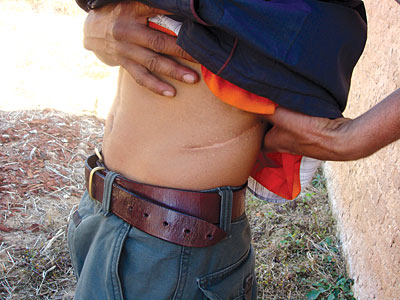 |
While the trade of human organs is a crime in Nepal, widespread poverty and a lack of education mean it is an everyday reality. The practice is so common in one village close to Kathmandu that the area is known as the "Kidney Bank."
Three years ago, 24-year-old Kanchha Budhathoki was working at a garment factory in Kathmandu when a fellow worker promised him a better job.
"He said he would find me a good job in India. When we reached New Delhi, we went to a hospital and they tested my blood. Another day they gave me alcohol then they gave me an injection. I became unconscious and when I woke up I was in hospital and they had already taken one of my kidneys," says Budhathoki.
Kanchha's mother Lalkumari Budhathoki says she is deeply upset that three of her sons have sold their kidneys. "If they had told me earlier, I would have stopped them. They told me that they wanted to earn more money. I never take one cup of tea from that money and in future I won't take anything from that money because it comes from organ selling," she says.
Badri Prasad Dhungana is a teacher at Kavre, and is trying to raise awareness against the growth of organ trade in the village.
"This is a serious problem in our village. Six years ago only four people had sold their kidneys in this place, but now I have recorded that 95 people have sold their kidneys in my village and close to this area. In some families there are four or five members who have sold their kidneys," he says.
There is no exact data on the numbers of people in this district who are engaged in the organ trade, but the estimate is more than 300 people have sold their kidneys here. Most Kavre residents are Dalits and Tamangs and live in abject poverty. Many are illiterate, so it's easy for the kidney brokers to take advantage of them. Gyan Bahadur Tamang unknowingly sold his kidney in India last year.
"Everyone was talking in Tamil so I didn't understand what they were saying," he recalls. "The next day I was taken to the same hospital and they gave me an injection. I became unconscious. When I woke up, they had taken my kidney without telling me."
The broker had taken him to Madras, India's kidney capital where the organs sell for more than $7,000 dollars on the black market. Gyan Bahadur received $900.
Selling human organs is a crime under Nepali law and those found to be selling human organs or aiding the activity can face up to 10 years in jail and a fine of $7,000. The law only allows for a blood relative to donate a kidney to an ailing family member. Local Journalist Bhim Gautam says the illegal kidney trade is booming, and the local government is not serious about controlling it. In 2008 a notorious Indian kidney broker, Amit Kumar, was arrested in Nepal. In May this year a Nepali man was arrested in New Delhi for trying to sell his wife's kidney. The two arrests however, have not affected the trade in Kavre.
Chuchhe Damia, a 49-year-old construction worker form the village, sold his kidney nine years ago for $850, but says he regrets the decision.
He says, "At that time I was in danger of losing my land and my house. So I gave my kidney and I did it knowingly, but now I think it would have been better to sell my land and my house instead of selling my kidney. So I want to tell other people please don't sell your kidneys."
Read also:
Take care, ELIPHA PRADHANANGA


